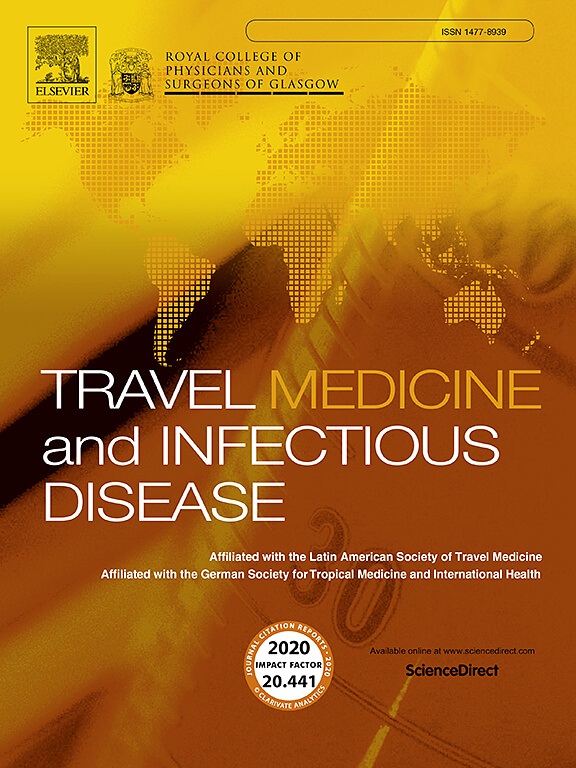The epidemiology and identification of risk factors associated with severe dengue during the 2023 dengue outbreak in Kaohsiung City, Taiwan
IF 4.7
3区 医学
Q1 INFECTIOUS DISEASES
引用次数: 0
Abstract
After the previous major dengue fever (DF) outbreaks in 2014 and 2015 in Taiwan, the second-largest DF outbreak re-emerged in 2023. A total of 178 patients with laboratory-confirmed dengue virus (DENV) infection, including 92 DENV-1 and 86 DENV-2 cases, were enrolled in this study conducted during the 2023 dengue outbreak in Kaohsiung City, Taiwan. This study aimed to analyze epidemiological characteristics, clinical severity, and risk factors for severe dengue (SD), as well as the diagnostic implications of the non-structural protein 1 (NS1) antigen rapid test. Patients infected with DENV-2 exhibited significantly older age, higher incidence of secondary infections, diabetes mellitus (DM), hypertension (HT), and longer hospital stays than patients infected with DENV-1. Multivariate analysis revealed that older age (age ≥65), secondary dengue infection, DM, and HT were significant independent predictors of SD. Compared with non-SD cases, SD patients were significantly more likely to be older (age ≥65), to exhibit a higher incidence of secondary infections and a greater prevalence of chronic diseases, including DM and HT. Notably, dengue-confirmed patients with negative NS1 results had a shorter duration since symptom onset (p < 0.001). Our DENV-1 and DENV-2 isolates are related to strains from neighboring Asian countries. Our findings emphasize the important factors of old age, secondary infections, and chronic diseases that contributed to dengue severity. We should meticulously manage these high-risk groups to prevent dengue progression. Screening incoming travelers for DF during the epidemic season will be an important measure to prevent the introduction of DENV into Taiwan.
台湾高雄市2023年登革热暴发期间重症登革热流行病学及相关危险因素的确定
继2014年和2015年台湾登革热大暴发之后,第二大登革热疫情于2023年再次出现。在2023年台湾高雄市登革热暴发期间,共收集实验室确诊登革热病毒(DENV)感染患者178例,其中DENV-1病例92例,DENV-2病例86例。本研究旨在分析重症登革热(SD)的流行病学特征、临床严重程度、危险因素及非结构蛋白1 (NS1)抗原快速检测的诊断意义。DENV-2感染的患者比DENV-1感染的患者年龄更大,继发感染、糖尿病(DM)、高血压(HT)发生率更高,住院时间更长。多因素分析显示,年龄较大(≥65岁)、继发性登革热感染、糖尿病和HT是SD的显著独立预测因素。与非SD患者相比,SD患者年龄较大(≥65岁),继发感染发生率更高,慢性疾病(包括糖尿病和HT)患病率更高。值得注意的是,NS1阴性的登革热确诊患者自症状出现以来持续时间较短(p <;0.001)。我们的DENV-1和DENV-2分离株与来自亚洲邻国的菌株有关。我们的研究结果强调了老年、继发感染和慢性疾病是导致登革热严重程度的重要因素。我们应该精心管理这些高危人群,以防止登革热的进展。在流行季节对入境旅客进行登革热筛查将是防止登革热病毒传入台湾的重要措施。
本文章由计算机程序翻译,如有差异,请以英文原文为准。
求助全文
约1分钟内获得全文
求助全文
来源期刊

Travel Medicine and Infectious Disease
PUBLIC, ENVIRONMENTAL & OCCUPATIONAL HEALTH-INFECTIOUS DISEASES
CiteScore
19.40
自引率
1.70%
发文量
211
审稿时长
49 days
期刊介绍:
Travel Medicine and Infectious Disease
Publication Scope:
Publishes original papers, reviews, and consensus papers
Primary theme: infectious disease in the context of travel medicine
Focus Areas:
Epidemiology and surveillance of travel-related illness
Prevention and treatment of travel-associated infections
Malaria prevention and treatment
Travellers' diarrhoea
Infections associated with mass gatherings
Migration-related infections
Vaccines and vaccine-preventable disease
Global policy/regulations for disease prevention and control
Practical clinical issues for travel and tropical medicine practitioners
Coverage:
Addresses areas of controversy and debate in travel medicine
Aims to inform guidelines and policy pertinent to travel medicine and the prevention of infectious disease
Publication Features:
Offers a fast peer-review process
Provides early online publication of accepted manuscripts
Aims to publish cutting-edge papers
 求助内容:
求助内容: 应助结果提醒方式:
应助结果提醒方式:


